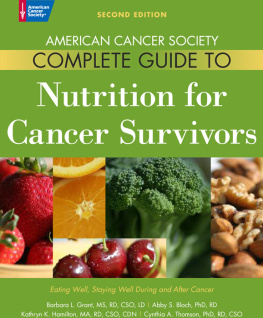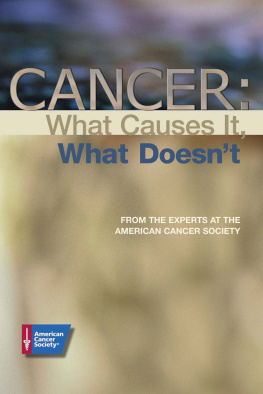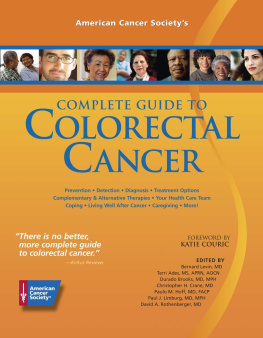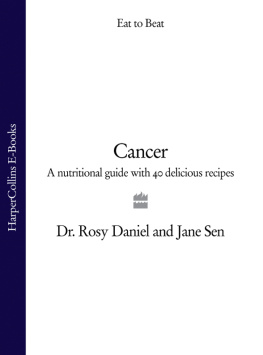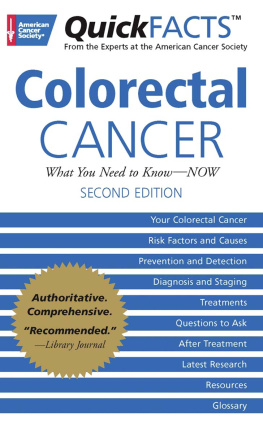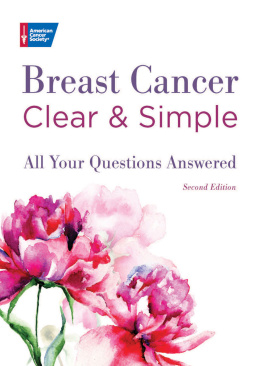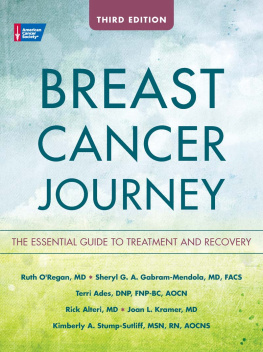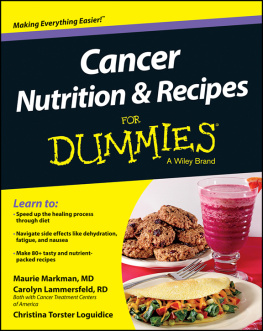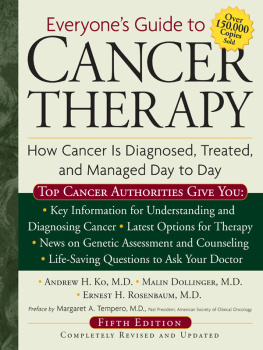SECOND EDITION
AMERICAN CANCER SOCIETY
COMPLETE GUIDE TO
Nutrition for
Cancer Survivors

Published by the American Cancer Society / Health Promotions
250 Williams Street NW, Atlanta, Georgia 30303-1002
Copyright 2010 American Cancer Society
All rights reserved. Without limiting the rights under copyright reserved above, no part of this publication may be reproduced, stored in or introduced into a retrieval system, or transmitted in any form or by any means (electronic, mechanical, photocopying, recording, or otherwise) without the prior written permission of the publisher.
For permission to reprint any materials from this publication, contact the publisher at .
Printed in the United States of America
Design and composition by LaShae V. Ortiz
Indexing by Bob Land
5 4 3 2 1 10 11 12 13 14
Library of Congress Cataloging-in-Publication Data
American Cancer Society complete guide to nutrition for cancer survivors : eating well, staying well during and after cancer / Barbara Grant [et al].2nd ed.
p. cm.
Rev. ed. of: Eating well, staying well during and after cancer. c2004.
Includes bibliographical references and index.
ISBN-13: 978-0-944235-78-2 (pbk.: alk. paper)
ISBN-10: 0-944235-78-6 (pbk.: alk. paper)
1. CancerNutritional aspects.
2. CancerDiet therapy.
I. Grant, Barbara (Barbara L.), 1958-
II. American Cancer Society.
III. Eating well, staying well during and after cancer.
IV. Title: Complete guide to nutrition for cancer survivors.
RC268.45.E285 2010
616.9940654dc22 2009050656
AMERICAN CANCER SOCIETY
Strategic Director, Content: Chuck Westbrook
Director, Cancer Information: Terri Ades, DNP, FNP-BC, AOCN
Director of Nutrition and Physical Activity: Colleen Doyle, MS, RD
Director, Book Publishing: Len Boswell
Managing Editor, Books: Rebecca Teaff, MA
Books Editor: Jill Russell
Book Publishing Coordinator: Vanika Jordan, MSPub
Editorial Assistant, Books: Amy Rovere
Quantity discounts on bulk purchases of this book are available. Book excerpts can also be created to fit specific needs. For information, please contact the American Cancer Society, Health Promotions Publishing, 250 Williams Street NW, Atlanta, GA 30303-1002, or send an e-mail to .
A NOTE TO THE READER The treatment information in this book is not official policy of the American Cancer Society and is not intended as medical advice to replace the expertise and judgment of your cancer care team. It is intended to help you and your family make informed decisions, together with your doctor.For more information about cancer, contact your American Cancer Society at
800-227-2345 or cancer.org .
CONTENTS
INTRODUCTION A cancer diagnosis affects everythingyour priorities, your family, your work, your outlook on life. The time after diagnosis can be stressful and difficult, a time filled with challenges and change. You and your family will be learning about your illness, your cancer treatment choices, and how to deal with work and family needs. What to eat may be the furthest thing from your mind. But eating well is more important than ever when you are preparing for, undergoing, or recovering from cancer treatment. Nutrition and Cancer Eating a healthy diet before, during, and after your treatment can help you in many ways:
- to feel better
- to reserve your strength and energy
- to maintain a healthy weight and your bodys store of nutrients
- to tolerate treatment-related side effects
- to maximize the benefits of treatment
- to decrease your risk of infection and maintain a healthy immune system
- to heal and recover quickly
During your treatment, you will be concentrating on fighting cancer. Eating well will help keep you strong and supply you with the nutrients your body needs. Maintaining good nutrition will help you feel better and stay strong. Eating as well as you can during your treatment and your recovery is an important part of taking care of yourself. There are no hard and fast rules about how to eat during cancer treatment. Eat as well as possiblethe importance of this cannot be overstated.During active cancer treatment, your overall nutritional goal should be to eat a variety of foods that provide the nutrients needed to maintain health while fighting cancer. Studies show that patients who eat well during cancer treatment are better able to tolerate chemotherapy, radiation therapy, surgery, or biotherapy and their side effects. People who meet their nutritional needs during cancer treatment may even be able to tolerate higher doses of treatments. Proper nutrition continues to be essential during recovery from treatment and in life after cancer, as well as for those living with advanced cancer.No one can predict how cancer treatment will affect you. Not everyone experiences side effects, and for those who do, not everyone experiences the same side effects or experiences them in the same way. People with cancer have unique nutritional needs and issues related to eating; whats more, these needs may change throughout the cancer experience. Your appetite may change from day to day. Foods may not taste or smell the way they did before treatment. You may be surprised by some of the foods that appeal to you during your treatment. Cancer and cancer treatments can also cause side effects that can affect what and how you eat. People going through treatment may have to deal with weight loss or weight gain. No matter what side effects you may experience, nutrition is an essential part of dealing with cancer and cancer treatment. Cancer Nutrition Information Advice about what to eat when you have cancer is everywherewhich foods help or hinder cancer treatment, diets that are presented as cancer cures, and how to eat if you are experiencing side effects from treatment. You may already have heard and read all kinds of information from fellow cancer patients, friends, on the Internet, and in books. Some informationsuch as advice you receive from your doctoris likely to be accurate and helpful; other suggestions may not help and may even be confusing or dangerous. How do you know where to start?The search for information about cancer nutrition can be a challenge. At times, even respected sources offer conflicting information. There may not be solid evidence about a particular issue, which confuses matters. The American Cancer Society Complete Guide to Nutrition for Cancer Survivors, Second Edition , will explore many of the important issues and facts about nutrition, diet, and cancer. Your health care teamyour doctor, registered dietitian, and nursecan evaluate your situation and help you decide which eating plan may work best for you. Rely on Your Health Care Team or Other Reliable Resources Each persons body, cancer, and reactions to treatment will be different. Members of your health care team are invaluable resources and can help you navigate the often confusing maze of information about nutrition. They can help you put together an eating plan that takes into account your cancer diagnosis, your treatment plan, any side effects you experience, and your immune status and overall nutritional needs. Listening to your body and paying attention to what its telling you will also help shape your nutrition plan to maximize your quality of life and your health.Your health care team may also be able to provide referrals to other experts or researchers if you want additional opinions or nutritional advice. You may be considering integrating supplements or complementary therapies into your treatment. Seek the advice of your health care team and let them know if you plan to use any supplements or complementary therapies so they can determine any interactions that could possibly interfere with your cancer treatment. Using alternative treatments instead of standard cancer treatments is not recommended; make sure to discuss any plan to use alternative therapies in the place of standard treatments with your doctor. also lists many resources for reliable information for people with cancer and their families or caregivers. How This Book Is Organized This book is designed for people with cancer and their families and other caregivers. It is organized so you can browse through it and read the sections that fit your current situation. Later you can read other sections as you need them. If you experience eating-related side effects during or after cancer treatment, you may first want to read the sections explaining how to cope with them. If you currently have no side effects or only mild side effects, you may find that the chapters about nutrition before treatment, particular foods of interest, dietary supplements, diets promoted as cures for cancer, and nutrition after treatment and for long-term wellness will be most useful.. Healthy Eating This chapter explains the components of a balanced diet and can help you learn the language needed to understand information about nutrition and cancer. Eating a healthy diet, maintaining a healthy weight, and being physically active are all essential aspects of maintaining well-being before, during, and after cancer treatment. Nutritional needs are often different for people with cancer, and this chapter discusses the importance of setting goals in preparation for cancer treatment and beyond.. Making Informed Decisions This chapter can help you navigate your way through the abundance of information about cancer and nutritionhow to research claims, understand study types, distinguish between complementary and alternative therapies, and interpret information about nutrition and cancer.. Hot Topics in Cancer and Nutrition This chapter discusses many foods of special interest to people with cancer. Topics include coffee, flaxseed, green tea, soy, sugar, alcohol, and many others that may get attention in the media for their possible links to cancer or better health. This chapter explores the claims made about certain foods and the evidence available about which foods may be helpful for those in cancer treatment or those hoping to reduce cancer risk.. How Food Is Grown and Treated This chapter provides information about the food you eat. Topics include genetically modified foods, irradiated foods, organic foods, pesticides, food additives, and how they affect people with cancer and those who have had cancer.. Dietary Supplements: Vitamins, Minerals, and Herbs This chapter defines dietary supplements and explores how to research them and talk about them with your doctor, how they are regulated and manufactured, and how to understand the claims and labels attached to dietary supplements. The potential risks for drug interactions are discussed, as well as the powerful effects of vitamins and minerals on your health, especially during cancer treatment.. Diet and Nutrition Therapies Promoted as Treatments and Cures This chapter explores various diets presented as curative or helpful for those with cancer. The potential risks and benefits associated with these diets will be discussed and you will be provided clear, evidence-based information about which diets may be helpful for those in cancer treatment or for people wanting to reduce cancer risk.. Preparing for Cancer Treatment This chapter offers suggestions for meal preparation, grocery shopping, ways that friends or family can help, and nutrition suggestions for people undergoing surgery, radiation therapy, chemotherapy, biotherapy, or hormonal therapy. Each treatment and its associated eating-related side effects are discussed briefly, along with some effective coping strategies.. Maintaining a Healthy Body Weight This chapter discusses the importance of body weight and why you might experience weight loss or weight gain during cancer treatment. Tools to evaluate your weight and coping strategies to deal with weight loss or weight gain are provided.. Coping with Treatment-Related Fatigue This chapter explains the causes of fatigue associated with cancer treatment, outlines coping strategies, and provides additional ways to boost your strength and energy.. Strengthening Your Immune System This chapter discusses how specific cancer treatments, including surgery, chemotherapy, biotherapy, and radiation therapy, can impact the immune system and how an altered immune system may affect your health during treatment. Coping strategies are provided, including tips about food preparation and storage safety.. Staying Hydrated This chapter stresses the importance of proper hydration during cancer treatment, outlining healthy fluid choices, causes of dehydration during therapy, and how to remain well hydrated, including daily fluid needs and suggestions. Water safety guidelines are also included.. Coping with Changes in Eating and Digestion Each person reacts differently to cancer treatment. This chapter covers potential treatment side effects, such as nausea and vomiting, diarrhea, constipation, lactose intolerance, changes in taste or smell, loss of appetite, sore mouth and throat, dry mouth or thick oral secretions, and difficulty eating and swallowing. Experts provide coping strategies to minimize discomfort and improve quality of life for those experiencing these treatment-related side effects.. Lifestyle Choices to Enhance Health for Cancer Survivorship This chapter provides suggestions for how cancer survivors can get back into healthy eating and physical activity. It also discusses the importance of good nutrition and being active in a healthful lifestyle and the effects of a healthy lifestyle on cancer recurrence.. Resource Guide This chapter lists various organizations and resources that provide reliable information and services for people dealing with cancer. Other Sections


